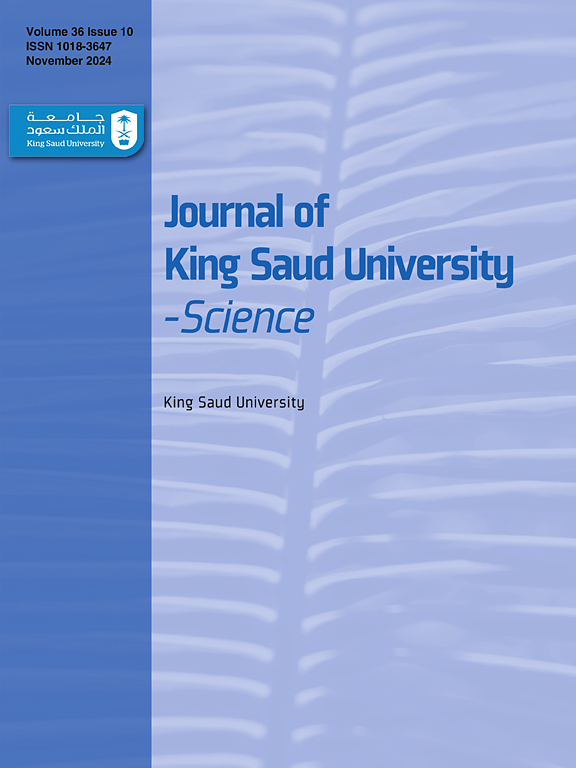樱草苷对抗聚乙烯微塑料诱导的心脏毒性的心脏保护潜力
IF 3.6
3区 综合性期刊
Q1 MULTIDISCIPLINARY SCIENCES
引用次数: 0
摘要
聚乙烯微塑料(PEMPs)是一种有毒的环境污染物,会损害包括心脏在内的多个器官。樱黄素(SKN)是一种潜在的类黄酮,具有多种药理作用。本研究旨在分析 SKN 在避免 PEMPs 引起的心脏毒性方面的防御作用。24 只雄性白化大鼠被随机分为 4 组:对照组、PEMPs(1.5 毫克/公斤-1)组、PEMPs + SKN(1.5 毫克/公斤-1 + 10 毫克/公斤-1)组和仅 SKN(10 毫克/公斤-1)治疗组。处理 30 天后,我们的结果显示,PEMPs 暴露降低了 Nrf2 和抗氧化基因的表达,同时增加了 Keap1 的表达。此外,PEMPs 中毒还会升高心脏标志物(CPK、LDH、肌钙蛋白 I & 和 CK-MB)的水平。此外,它还降低了 GSH、GST、SOD、HO-1、CAT、GSR 和 GPx 的活性,而 MDA 和 ROS 的水平则升高了。相反,炎症标志物(即 COX-2 活性、IL-1β、TNF-α、NF-kB & 和 IL-6)的水平升高。此外,凋亡标志物(即 Bax 和 caspase-3 )的表达升高,而 Bcl-2 的表达降低。然而,SKN 治疗可明显恢复 PEMPs 诱导的生化失调。因此,SKN 可用作一种治疗化合物,以改善 PEMPs 诱导的大鼠心脏损伤,这可能是由于它具有巨大的药物治疗潜力。本文章由计算机程序翻译,如有差异,请以英文原文为准。
Cardioprotective potential of sakuranetin to counteract polyethylene microplastics induced cardiotoxicity
Polyethylene microplastics (PEMPs) are toxic environmental contaminants which can impair multiple organs including heart. Sakuranetin (SKN) is a potential flavonoid with diverse pharmacological benefits. This research was undertaken to analyze the defensive impact of SKN to avert PEMPs-induced cardiotoxicity. 24 male albino rats were randomly allocated into 4 separate groups: control, PEMPs (1.5 mg kg−1), PEMPs + SKN (1.5 mg kg−1 + 10 mg kg−1) and only SKN (10 mg kg−1) treated group. After 30 days of treatment, our results revealed that PEMPs exposure reduced the expressions of Nrf2 and antioxidant genes while increasing Keap1 expression. Besides, PEMPs intoxication escalated the levels of cardiac markers (CPK, LDH, Troponin I & CK-MB). Additionally, it lessened the activities of GSH, GST, SOD, HO-1, CAT, GSR, GPx whereas the levels of MDA and ROS were increased. Conversely, the levels of inflammatory markers i.e., COX-2 activity IL-1β, TNF-α, NF-kB & IL-6 were augmented. Moreover, the expressions of apoptotic markers i.e., Bax and caspase-3 were elevated while the Bcl-2 expression was decreased. However, SKN treatment significantly restored the PEMPs-induced biochemical dysregulations. Therefore, SKN could be used as a therapeutic compound to ameliorate PEMPs-induced cardiac impairments in rats, possibly due to its tremendous pharmacotherapeutic potential.
求助全文
通过发布文献求助,成功后即可免费获取论文全文。
去求助
来源期刊

Journal of King Saud University - Science
Multidisciplinary-Multidisciplinary
CiteScore
7.20
自引率
2.60%
发文量
642
审稿时长
49 days
期刊介绍:
Journal of King Saud University – Science is an official refereed publication of King Saud University and the publishing services is provided by Elsevier. It publishes peer-reviewed research articles in the fields of physics, astronomy, mathematics, statistics, chemistry, biochemistry, earth sciences, life and environmental sciences on the basis of scientific originality and interdisciplinary interest. It is devoted primarily to research papers but short communications, reviews and book reviews are also included. The editorial board and associated editors, composed of prominent scientists from around the world, are representative of the disciplines covered by the journal.
 求助内容:
求助内容: 应助结果提醒方式:
应助结果提醒方式:


